07 Mar Resumen del Next 06
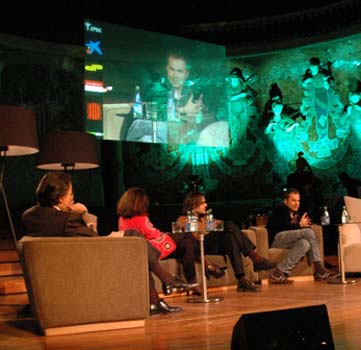
English Follows | Chinese Follows |Text en català
Alfons Cornella: ?Es el momento de aplicar la imaginación en los negocios aprovechando el efecto multiplicador de la tecnología?
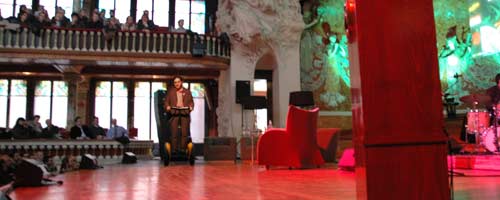
Más de 1.300 personas llenaron el Palau de la Música de Barcelona el pasado 17 de febrero para seguir de cerca el Next que, bajo el título ?The Business Imagination Fest?, cumplía una década vaticinando qué es lo que va a pasar en los próximos meses. Y el Next?06 fue más dinámico y creativo que nunca, con brillantes presentaciones audiovisuales, música en directo y ponentes de gran nivel, entre los que destacaba Alex Tai, director del proyecto del nuevo turismo especial que lidera Virgin Galactic, así como la presencia del presidente de la Generalitat, Pasqual Maragall, quien fue el encargado de clausurar el acto.

Alfons Cornella, fundador y presidente de Infonomía, abrió el evento haciendo una breve semblanza de los objetivos del Next y del camino recorrido por su empresa en estos 10 años, como red de innovadores y publicación pionera de la cultura de la innovación en nuestro país.

Alex Tai, el primer ponente, Operations Manager de Virgin Galactic, fue el invitado especial de este décimo aniversario de Next y el encargado de iniciar el acto con la primera de las intervenciones. Virgin Galactic es la compañía fundada por el empresario británico Richard Branson como primera tour operadora de viajes espaciales del mundo. Como responsable de sus operaciones, Alex Tai es el encargado de supervisar el diseño y construcción de la Space Ship II y será el piloto de su primer viaje comercial previsto para el año 2008. Un proyecto que, como el mismo Tai manifestó al iniciar su presentación, demuestra que la innovación puede dar resultados brillantes y a priori inimaginables.
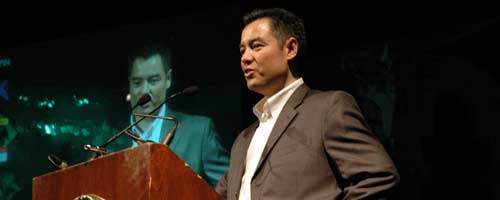
Para Marcel Planellas, secretario general de Esade y miembro del Consejo de Infonomía, en el momento actual muchas empresas están mirando fuera de sus organizaciones para buscar talento y externalizar procesos que no forman parte de su core business, pero ?las empresas líderes serán aquellas que también sepan mirar hacia dentro de su organización y busquen la manera de desarrollar los recursos internos, para adaptarse, innovar y conseguir diferenciarse de sus competidores? Y para ello la clave va a ser la imaginación.

Rosa Vergés, directora de cine, afirmó que actualmente existe el riesgo de que mientras las tecnologías audiovisuales siguen avanzando de manera vertiginosa, nos podamos convertir en analfabetos de la imagen. ?En esto puedo empezar a coincidir con la teoría del fotógrafo Català Roca, quien sostenía que la Gioconda había llegado a ser un cuadro tan popular gracias a su pequeño formato que facilitó en su momento que pudiera viajar por toda Europa de exposición en exposición?.
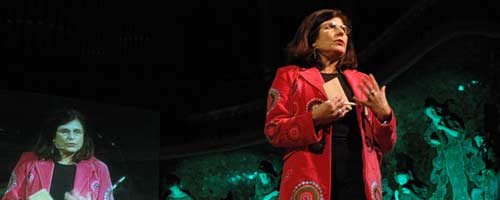
Rolf Tarrach, científico y Decano de la recientemente creada Universidad de Luxemburgo, comentó que la clave para avanzar hacia la innovación, ?son las personas? por lo que hay que incorporar en las empresas profesionales con un mayor nivel de formación. El problema es que los doctorados todavía están enfocados sólo hacia la investigación y son demasiado ?academicistas?.
Destacó que ?en España nos falta tradición científica. Y la tradición, por definición, necesita tiempo. Si se siguen dando los pasos correctos, en 25 años podremos competir con los mejores?. Mientras tanto ?hay que tener paciencia?, señaló, porque, aunque los resultados todavía no sean apreciables en algo concreto, de momento, los jóvenes obtendrán unos beneficios indudables y eso repercutirá en la competitividad de las empresas a las que se incorporen.
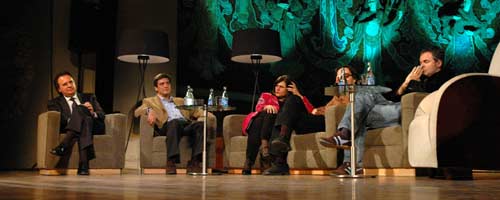
En otro ámbito muy distinto, Félix Tena, fundador y director general de Imaginarium, habló de ser diferente, de arriesgar y de explorar continuamente lo nuevo como única actitud para sobrevivir en los actuales entornos de negocio. ?La innovación es un riesgo, pero también la única alternativa?. Para el presidente de Imaginarium vivimos un momento de cambios acelerados, difícil de comprender, pero precisamente por eso mismo, de sumo interés. Se trata de un momento, según Tena, perfecto para aquellas empresas dispuestas a jugar el juego de la innovación, para saltar a nuevas fases de crecimiento y de valor. ?A cambio de este crecimiento, la empresa debe arriesgar. Yo creo que se trata de un riesgo que siempre vale la pena correr. Si no, la vida sería demasiado aburrida?.
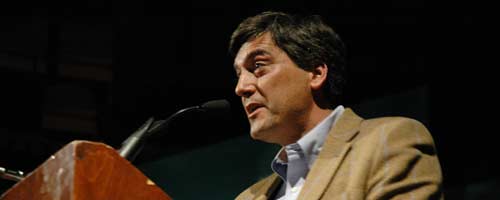
La ponencia de Risto Mejide, creativo de SCPF, el cual ha pasado por las mejores agencias del país y que acaba de vender un proyecto en Miami a la misma Warner para hacer un serie televisiva sobre publicistas cómo él, tuvo como mensaje que ?el reto para las agencias es plantearse what?s next en los próximos años? que les ayude a superar la crisis de ideas y las limitaciones del formato spot de 30 segundos en un siglo XXI en que la ?muerte de la televisión? es ya una crónica anunciada. ?El reto para las agencias en los próximos años será que, en vez de plantearnos qué tipo de spot le podemos vender al anunciante, hemos de plantearnos muy seriamente qué le podemos ofrecer que no sean los 30 segundos? sentenció.

Josep Maria Sabadell, director del sector público y servicios financieros de SAP, y Beth Galí, de BB+GG Arquitectes fueron los encargados de cerrar el turno de ponencias con sendas intervenciones grabadas en vídeo, y presentadas con un formato experimental de ping-pong en las respuestas por parte de ambos a las preguntas que les formularon.
Beth Galí vaticinó que cabía esperar ?el cruce de disciplinas y de tecnologías de muy diferentes campos? y afirmó que ?la imaginación lleva a la innovación pero ésta necesita contar con unos recursos que es por lo que ?en este país muchas veces el espíritu creativo queda un poco corto?.

En este contexto, Josep Maria Sabadell pronosticó algunos de los avances más significativos que cabe esperar en las TIC en los próximos cinco años, como la proliferación de las redes inalámbricas de capacidades excepcionales
(Wimax, 4G, BGAN…) o las tecnologías que permiten una trazabilidad longeva y que sustituye a las personas como introductoras de datos (identificación por radiofrecuencia?). ?Esta infraestructura ha avanzado y seguirá avanzando, pero lo que está cambiando generacionalmente con rapidez son los procesos ?el software? y los contenidos que fluyen y utilizan esta infraestructura? señaló.
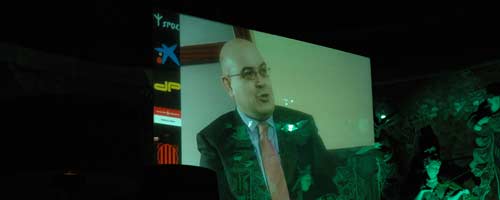
Martin Varsavsky, quien fuera promotor de iniciativas empresariales en el sector de las telecomunicaciones como Jazztel o Ya.com, lo es ahora de FON, un proyecto que nace con el objetivo de convertirse en referente mundial de una Internet sin cables.
FON quiere crear una gran red de puntos de acceso Wi-fi que los usuarios cederán a cambio de poder conectarse al resto de puntos de acceso pertenecientes a esta comunidad. FON intentará, por una parte, definir el sistema tecnológico necesario para la creación de esta comunidad y, por otra, abordar el concepto desde su perspectiva funcional y de cohesión entre los diferentes actores sociales.
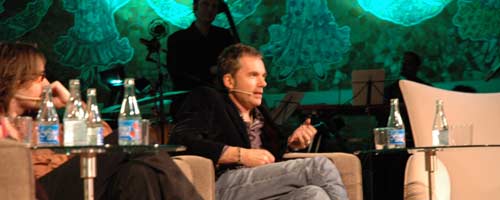
Como conclusión Alfons Cornella hizo una llamada contra el pesimismo subrayando la gran riqueza de iniciativas innovadoras que hay en este país. Pero, la cuestión es darlas a conocer, al igual que hace Infonomía, porque ?cuando hemos ido a hablar con muchas de ellas, nos han dicho que era la primera vez que alguien de aquí se interesaba en saber en qué estaban innovando, aunque algunas hubiesen salido en el Financial Times?.
A continuación, remarcó la necesidad de ?encontrar una conexión más íntima entre universidad y empresa. Nos hace falta un gran proyecto, nacional de Business2Universtiy?. En este sentido, Cornella apostó por ?colocar centenares de doctores en las empresas? y de ?construir un sistema de innovación en el país?.

Por último, recordó que el proyecto de Infonomía ?va a seguir luchando, frecuentemente contra corriente, por dar a conocer la energía de los centenares de innovadores del país. Por aprender de ellos, y en lo que será nuestro principal foco de energía en los próximos meses, por conectarlos entre sí, conectaros entre vosotros, a través de una bolsa de proyectos».
El Presidente de la Generalitat de Catalunya, Pasqual Maragall, fue el encargado de clausurar el acto de esta décima edición del Next. Tras felicitar a Infonomía por este aniversario y por haber conseguido la que calificó como ?una de las redes de gente inquieta más importantes del país?, Maragall manifestó su convencimiento de que la innovación resulta un elemento clave en el desarrollo futuro, aunque declaró que la verdadera revolución consistirá en hacer de este elemento ?una actitud diaria, el pan nuestro de cada día?.
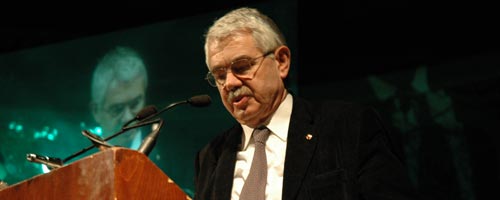
Las frases:
Marcel Planellas: ?El reto para las empresas líderes del s.XXI será cómo hacer compatible esta creatividad en las grandes empresas a la vez que siguen creciendo y haciéndose más complejas?.
Félix Tena: ?Estamos totalmente vinculados al estilo de vida de nuestros clientes, y este estilo de vida cambia tan rápidamente, que sólo las empresas capaces de innovar a la misma velocidad son capaces de sobrevivir?.
Martin Varsavsky: ?Los españoles no tienen nada que envidiar a los profesionales de otras partes del mundo. El por qué se envidian entre ellos es una cosa que no puedo acabar de entender?.
Rosa Vergés: ?Velázquez hubiera sido un gran director, Edgar Allan Poe un estupendo guionista, Miguel Ángel un gran director artístico?.
Josep Maria Sabadell: ?La imaginación es ver la realidad desde otras perspectivas de manera que nos ayude a formularnos preguntas y respuestas para reformular la realidad? .
Beth Galí: ?La imaginación lleva a la innovación pero ésta necesita contar con unos recursos que es por lo que en este país muchas veces el espíritu creativo queda un poco corto?.
Risto Mejide: ?Las agencias no podemos seguir vendiéndoles a nuestros anunciantes: la respuesta es un spot de 30 segundos, ahora dime cuál es el problema?.
Rolf Tarrach: ?La ciencia nos ayuda a explorar el espacio que nos rodea y a realizar predicciones, y eso es exactamente lo que tienen que hacer los empresarios: explorar su entorno, analizarlo y ver cómo pueden introducir algo nuevo?.
Alfons Cornella: ?Hace falta la renovación ambiciosa de las empresas del país, para que tengan un papel relevante en el mundo, un proyecto nacional?.
Alex Tai: ?Durante mucho tiempo ha existido cierto escepticismo sobre lo que queríamos conseguir pero la realidad hoy es que ya hemos estado allí en tres ocasiones?.
Fotografia: Silvia Langa
Next’06
?It’s time to be imaginative in business and take advantage of the multiplying effect of technology?
Over 1,300 people were present at Barcelona’s Palau de la Música on 17th February to attend the Next ?Business Imagination Fest?, marking a decade of predicting what will happen in the coming months. Next?06 was more dynamic and creative than ever, with excellent audiovisual presentations, live music and prestigious speakers. Prominent guests included Alex Tai, director of the new special tourism programme led by Virgin Galactic, as well as the President of the Autonomous Government of Catalonia, Pasqual Maragall, who was charged with closing the act.
Alfons Cornella, founder and president of Infonomía, opened the event with a brief outline of the objectives sought by Next and a summary of the path travelled by the company, a network of innovators and a pioneering publication focusing on the culture of innovation in Spain, in its 10 years of existence.
The first speaker, Alex Tai, Operations Manager of Virgin Galactic, was the special guest at this event marking Next’s tenth anniversary and was responsible for opening the event with the first presentation. Virgin Galactic, founded by the British entrepreneur Richard Branson, is the world’s first space voyage tour operator. As Operations Manager, Alex Tai is responsible for supervising the design and the construction of Space Ship II and he will also pilot its first commercial flight planned for 2008. As Tai demonstrated at the beginning of his presentation, it is a project that proves that innovation can bring about brilliant results that were previously unimaginable.
According to Marcel Planellas, Secretary General of ESADE and a member of the Infonomía Board, many companies are currently looking outside their own organisations to find talent and outsource processes that do not form part of their core business. However, he believes that ?the leading companies will be those that also know how to look within their own organisations and find a way to develop internal resources to adapt, innovate and distinguish themselves from their competitors?. The key in doing this lies in being imaginative.
The film director Rosa Vergés warned that while audiovisual technologies continue to advance at a breathtaking rate, we run the risk of becoming visually illiterate. ?In this, I share the theory elaborated by the photographer Català Roca who maintained that the Mona Lisa has become such a famous painting largely thanks to its small size, which has meant it can be easily moved all around Europe, from exhibition to exhibition?.
Rolf Tarrach, scientist and Rector of the new University of Luxembourg, commented that the key to moving towards innovation lies in ?the people? and it is therefore necessary for companies to recruit professionals with higher levels of education and training. The problem is that PhD courses are still based on research and are too ?academic?.
He stressed that ?in Spain there is a lack of scientific tradition, and tradition, by definition, needs time. If the appropriate steps are taken, within 25 years we will be able to compete with the best?. In the meantime, however, ?we must be patient?, he added, as although the results cannot be observed in any concrete form as yet, young people will enjoy the benefits of this work and this will have an impact on the competitiveness of the companies that hire them.
In a completely different field, Félix Tena, founder and Director General of Imaginarium, stated that the only way to survive in the current business environment was to be different, take risks and continuously explore new grounds. ?Innovation is a risk, but it is also the only alternative?. The president of Imaginarium believes we are living in a time of rapid changes which are difficult to understand, but that it is precisely this factor that makes things more interesting. According to Tena, it is a perfect time for companies willing to play the innovation game, a perfect moment to advance towards new phases of growth and values. ?In exchange for this growth, companies must take risks. I think it’s a risk that is always worth taking. If not, life would be very boring?.
Risto Mejide, an SCPF copywriter who has worked for some of the country’s best agencies and has just sold a project to Warner in Miami for a television series about publicists like himself, stated that ?the challenge for agencies is to think about what the next big thing will be in the coming years? to help them overcome the ideas crisis and the limitations of the 21st century 30-second advertising format when the ?death of television? is already taken as read. ?The challenge for agencies in the coming years will be that, instead of thinking about what kind of advert we can sell to the advertiser, we have to seriously think about what we can offer them that isn’t in a 30-second format?, he added.
Josep Maria Sabadell, Public Sector and Financial Services Director of SAP, and Beth Galí from BB+GG Arquitectes closed the speeches using an experimental ‘ping-pong’ video format to answer the questions that were directed at them.
Beth Galí predicted that ?a fusion of very different disciplines and technologies? could be hoped for and stated that ?imagination brings about innovation but requires certain resources. The lack of these resources is stunting the growth of the creative spirit in many countries?.
Josep Maria Sabadell spoke of some of the most important advances that could be expected in terms of ICT within the next five years. These included the proliferation of wireless networks with exceptional capacities (Wimax, 4G, BGAN, etc.), as well as technologies to enable long-lasting traceability and a future solution to manual data entry (radio-frequency identification, etc.). ?This infrastructure has advanced and will continue to advance, but what is changing with every generation ? and fast ? are the process, the software, and the contents that flow through and use this infrastructure?, he added.
Martin Varsavsky, a former promoter of business initiatives in the telecommunications sector for companies such as Jazztel and Ya.com, spoke about FON, a project designed to become an international benchmark for wireless Internet.
FON intends to create a large network of Wi-fi access points that users will concede use of in exchange for being able to connect to the rest of the access points within the community. FON is looking to define the necessary technological system required to create such a community, as well as tackle the idea from a functional perspective, taking into account cohesion between the different social representatives.
In conclusion, Alfons Cornella spoke strongly against pessimism, underlining the great wealth of innovative initiatives in Spain. However, the point is making these known. Infonomía, in its quest to transmit this information has found that ?when we have gone to speak to many of these innovators, they have told us that it was the first time anyone from here was interested in knowing about these innovations, even though some may have been printed in the Financial Times?.
He then stressed the need to ?find a closer connection between universities and business. We need a serious Business2Universtiy project on a national level?. He recommended ?placing hundreds of PhD graduates in companies? and ?building an innovation system throughout the country?.
Finally, he added that the Infonomía project ?will continue to fight, frequently against the current, to transmit the energy of hundreds of innovators in Spain. To learn from them and, in what will be our main focus in the coming months, to bring them together through a project network?.
The President of the Autonomous Government of Catalonia, Pasqual Maragall, was responsible for closing this tenth edition of Next. After congratulating Infonomía for reaching their tenth anniversary and creating what he called ?one of the country’s leading networks of enterprising people?, Maragall declared that innovation is a key element for future development, although he said that the real revolution will be making this part of ?our day-to-day attitude, our daily bread?.
In quotes:
Marcel Planellas: ?The challenge for leading companies in the 21st century will be how to make this creativity compatible with large companies as they continue to grow and become more complex.?
Félix Tena: ?We are completely bound by the lifestyle of our customers, and this lifestyle changes so rapidly that only companies able to innovate at the same speed will survive.?
Martin Varsavsky: ?The Spanish haven’t got anything to be jealous about with regard to professionals from other parts of the world. I really don’t understand why this jealously exists between them?.
Rosa Vergés: ?Velázquez would have been a great director; Edgar Allan Poe, an incredible scriptwriter; and Michelangelo, a wonderful artistic director?.
Josep Maria Sabadell: ?Imagination is seeing reality from other perspectives and using these perspectives to help us formulate questions and responses in order to recast reality?.
Beth Galí: ?Imagination brings about innovation but requires certain resources. The lack of these resources is stunting the growth of the creative spirit in many countries?.
Risto Mejide: ?Agencies can’t continue selling themselves to their advertisers: the response is a 30-second advertising spot, so tell me what the problem is?.
Rolf Tarrach: ?Science helps us to explore the environment around us and make predictions, and this is exactly what businesses have to do: explore their environment, analyse it and see how they can introduce something new into it?.
Alfons Cornella: ?There’s a need for an ambitious renovation of Spanish companies so they can play a relevant part in the world ? a national project?.
Alex Tai: ?There has been a certain scepticism for some time now about what we would like to achieve, but the reality today is that we have already been there on three occasions?.
Photography: Silvia Langa
?Next 06盛会?小结
?利用科技的增殖因素来做生意??把这个想象付诸实践的时候到了。? ??Alfons Cornella如是说
2月17日这天,巴塞罗那音乐厅座无虚席,一千三百多人聚集于此,参加今年Next??一个十年来对未来几个月情况做预测的组织??题为?商业想 象力盛会?(?The Business Imagination Fest?)的活动。现场音乐演奏和诸多高层人士的出席,使得本届盛会比往届更富有活力和创造性,他们之中包括了Virgin Galactic公司特别新旅行项目经理Alex Tai,以及加太罗尼亚自治区主席Pasqual Maragall??他为盛会致了闭幕辞。
Infonomía的创始人及总裁Alfons Cornella用他简短的发言将盛会拉开了帷幕,其中他提到了Next的目标以及这十年来所走过的道路,包括开办创新者网以及成为我们国家(指西班牙,下文多处类似)创新文化推广的排头兵。
Virgin Galactic公司的经营经理Alex Tai,作为这次Next十周年庆典的特别嘉宾,头一个参加了大会的发言轮。Virgin Galactic是由英国企业家Richard Branson创办的世界上第一家经营特殊旅行业务的企业。Alex Tai作为这些业务的总管,负责督导Space Ship II的设计和建造,并将于2008年它首航时担任领航驾驶。在发言一开始,Tai谈到了这个项目将能展示出创新如何带来光辉的利润以及更多不可预料的附加 效应。
Esade的秘书长同时又担任Infonomía公司董事的Marcel Planellas则认为,当前许多企业都是向外看,即在本公司的组织机构以外寻找灵感并把一些本公司非核心的商业过程外向委托化,但其实?只有那些同时 又懂得向内看、从本公司自身的组织机构中寻找内部资源的发展和进行革新、让自己在竞争中显得独一无二的企业,才能真正居于领导地位。?而对于这一点来说, 关键就在于想象力。
电影导演Rosa Vergés非常肯定地认为,在当前多媒体视频技术发展得头晕目眩之时,有一种危机就是我们会变成影像文盲。?在这方面,我和摄影师Català Roca持相同意见,他认为Gioconda这幅画之所以能拥有如此高的知名度,就是因为它小巧的格式使得它可以轻松地穿梭于欧洲大陆的各个展览之间。
科学家、同时又是新成立的卢森堡大学校长的Rolf Tarrach也阐述了他的观点,创新的关键因素?是人才?,因此应当向企业中注入教育程度更高的专业人士。问题是博士们仍然在更多地关注研究,并且过分?学术化?了。
他特别指出?在西班牙,我们缺少科学的传统。而之所以称之为传统,就是因为它需要时间。如果能够继续迈出正确的步伐,那么25年后,我们将有能力 同最顶级的对手进行竞争。同时他也谈到?需要有耐心?,因为虽然迄今为止还没有什么具体的令我们值得称道的数字,但是年轻一辈将毫无疑问得到更多好处,这 一点也将映射到他们加盟企业的竞争中去。
Imaginarium的创始人和总经理Félix Tena则从另外一个角度进行了发言,他认为要与众不同、要冒险并把持续不断的开发作为在当今商业环境中生存下去的唯一态度。?创新是种冒险,但也是唯一 的选择。?根据这位Imaginarium的老总,我们活在一个变化加速度的时代,很难理解为什么,但也正因为如此,它是一个非常引人入胜的。Tena认 为,对于那些愿意尝试用创新的办法来更新发展阶段和价值的企业来说,这个时代是完美的。?而要获取这个发展机会,企业就必须冒险。我认为这是一个非常值得 去冒的险。不然,生活就太了无生气了。?
SCPF创意总监Risto Mejide也做了发言,他曾在国内最好的几家广告代理供职,并刚刚成功地在迈阿密向华纳出售了一个电视剧项目,就拍那些跟他一样的广告人。他认为?广告 公司面临的挑战就是要发现接下来几年会发生什么?,只有这样才能帮助他们客服灵感枯竭、30秒钟限制以及二十一世纪那已经被宣告了的?电视的死亡?。他又 强调:?接下来几年中,广告代理公司的挑战不再是设法预计什么样的时空点(spot)我们能够向客户进行销售,而是要非常认真地考虑我们能向他们销售什么 不是这30秒钟的东西。?
SAP公司公共关系和财政服务经理Josep Maria Sabadell和BB+GG Arquitectes 事务所的Beth Galí是两位通过录好的录像进行最后发言的。这两段录像被剪辑合成为乒乓球的模式,根据向他们提到的问题就行回球解答,具有试验科学的精神。
Beth Galí预言说?跨学科和跨技术领域的交叉?是在期待范围之内的,但同时他又肯定道?想象产生创新,但创新同时也需要一些其他资源,这也就是为什么在这个国家很多时候创造精神会显得不够。
在这个话题中,Josep Maria Sabadell断言了未来五年中将在IT领域中出现的一些决定意义性质的发展,比如超大能力无线网络的繁衍增殖(Wimax,4G, BGAN??),或者那些具有长久性的描绘能力或者能替代人力进行资料录入的技术(无线电频率识别??)。?这方面的基础设施已经开始建设,并将越来越发 达,但总体来说更快的变革来自于过程??即程序软件??还有来自这些基础设施所能涉及到的内容。?他同时指出。
Martin Varsavsky曾担任电讯行业诸如Jazztel和Ya.com公司的企业项目推广,如今被叫作FON项目,它的目标是成为无线因特网方面的世界领先 者。FON的意图是打造一个巨大的Wi-fi无线网,其用户需要让步以链接至属于这个网络空间的其他接入点。FON将在一方面努力创造一个让该网络空间可 行的技术系统,另一方面将试图从功能的角度在不同的社会角色之间定义一个新的模式。
作为发言轮的结束,Alfons Cornella提出要对抗消极情绪,并强调在这个国家正在涌现出巨大的创新财富宝库。而问题,就是要让它们浮出水面、被人们了解,就像 Infonomía做的那样,因为?当我们去向人们谈论这些创新资源的时候,很多次人们告诉我这是第一次在这个地方有人想这个创新,虽然,可能有的点子曾 经出现在《金融时报》(Financial Times)上。?
接着,他再次强调了需要?找到大学和企业之间更亲密的连接点。我们缺少一个伟大的项目,一个国家级的项目 Business2Universtiy,即?从商界到大学?(Business to Universtiy)?。在这个意义上,Cornella寄希望于?把成百上千的博士放到企业中去?和?打造一个全国性的创新系统?。
最后,他还提醒大家Infonomía的项目?会持续地和世俗观念做斗争,好让我们国家不计其数的创新者的能量被认识,让社会向他们学习。而我们接下来几个月的工作重点就将是把创新者联结在一起,通过一个项目库进行相互了解。?
加太罗尼亚自治区主席Pasqual Maragall为本届Next盛会致了闭幕辞。在向Infonomía公司致以周年庆贺并称赞它集结了?全国最富有创造力的一群人?之后,他对创新在未 来发展中将起到的核心作用表示赞同,但同时他也指出,只有把创新这个元素变成?一种每天坚持的态度、我们每天必吃的面包?,那才算的上是真正意义的革命。
言论:
Marcel Planellas:?二十一世纪一流企业要面对的挑战就是如何在大公司的创造力和不断发展壮大并越发复杂化之间寻找到平衡。?
Félix Tena:?我们和我们客户的生活方式完全联系在一起,而他们的生活方式变化如此之快,致使只有那些能以同样速度进行创新的企业才能够继续存活。?
Martin Varsavsky:?西班牙人用不着羡慕世界上其他地方的同行。我一直不理解为什么他们之间会相互妒忌。?
Rosa Vergés:?Velázquez(活在今天的话)将成为伟大的导演,Edgar Allan Poe是优秀的编剧,而Miguel Ángel则可以作艺术指导。?
Josep Maria Sabadell:?想象力就意味着从另外的角度来看待现实,它帮助向我们自己提出问题和给出答案并因此重新给出另一个版本的现实。?
Beth Galí:?想象产生创新,但创新同时也需要一些其他资源,这也就是为什么在这个国家很多时候创造精神会显得不够。?
Risto Mejide:?我们广告代理商不能继续向客户这么推销了:答案是30秒钟的时空,现在告诉我遇到了什么麻烦。?
Rolf Tarrach:?科学帮助我们探索空间和进行预测,企业家们所应做的其实完全相同:探索周边环境、对它进行分析然后看看如何能往里面加点新东西。
Alfons Cornella:?必须是这个国家的企业一同进行大胆的创新,就像是一个全国性的项目,以在世界上占有明显的位置。?
Alex Tai:?很长一段时间以来,外界对于我们的计划一直存在这样或那样的怀疑,但事实是,今天,我们都已经去到那里三次了。?
摄影:Silvia Langa



Sorry, the comment form is closed at this time.